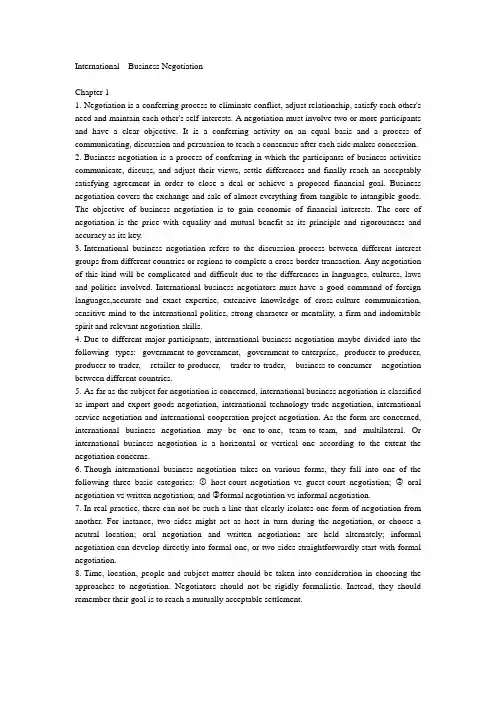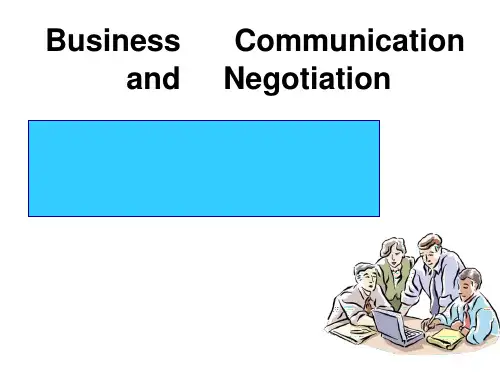Chapter1 国际商务沟通与谈判
- 格式:ppt
- 大小:5.23 MB
- 文档页数:29



![商务沟通与谈判[范文模版]](https://uimg.taocdn.com/85faefdd9f3143323968011ca300a6c30c22f1e6.webp)
商务沟通与谈判[范文模版]第一篇:商务沟通与谈判[范文模版]商务谈判人员素质的培养在当今社会,经济高速发展,我们时刻面对着各种竞争和压力。
谈判不再仅仅局限在商业活动中,而是已经融入平常生活中。
如何快速有效取得一项谈判的成功,对于我们将来的工作和生活很重要。
谈判有很多类型,而“双赢谈判”则是我们最常见的一种。
双赢谈判是把谈判当作一个合作的过程,谈判的双方通常在利益与需求上存在一定的矛盾,需要通过谈判来化解矛盾,并尝试和对手像伙伴一样,共同去找到满足双方需要的方案,使冲突更少、费用更合理、风险更小。
它强调的是:通过谈判,不仅化解矛盾,同时找到最好的方法去满足双方的需要,解决权利、责任和义务的分配,如成本、风险、市场和利润的分配。
“双赢谈判”的结果是你赢了,但我也没有输。
从倡导和发展趋势的角度说,“双赢谈判”无疑是解决矛盾、保证双方利益和需要的最好途径,但是在实际工作中“双赢谈判”却有着诸多障碍。
作为一名专业的商业谈判者,需要多方面的素质,尤其以知识、心理素质、谈判技能、礼仪素质、身体素质最为重要。
1.知识要广博除了掌握过硬的专业知识,还要对心理学、经济学、管理学、法学、财会学、政治学、历史学等方面的知识有一定了解。
具有较强的法律意识,也要尽可能熟练地掌握本国经济法规以及国际经济法的有关规定。
学习与掌握有关工程技术知识。
熟练掌握外语在国际谈判中具有十分积极的意义。
此外,还要要了解有关国家或地区的社会历史,风俗习惯以及宗教等状况以及对方谈判人员在其特有的文化背景下所形成的谈判作风与谈判方式。
知识的增长主要靠自己有心积累,要观察得细一点,考虑得多一点,在平时多听、多学、多分析、多实践。
同时,谈判人员应该谦虚好学,善于从各方面专家那里汲取所需要的知识。
这样日积月累,知识就会丰富起来,就能得心应手地驾驭谈判的过程。
2.乐观积极的心理耐心、毅力是一个谈判人员应该具备的基本素质。
在商务谈判中,有些对手也会以拖延时间来试图消磨我方的意志,以求获取更好的谈判条件,对付这种伎俩没有坚忍的毅力是不可能的。

International Business NegotiationChapter 11.Negotiation is a conferring process to eliminate conflict, adjust relationship, satisfy each other's need and maintain each other's self-interests. A negotiation must involve two or more participants and have a clear objective. It is a conferring activity on an equal basis and a process of communicating, discussion and persuasion to teach a consensus after each side makes concession.2.Business negotiation is a process of conferring in which the participants of business activities communicate, discuss, and adjust their views, settle differences and finally reach an acceptably satisfying agreement in order to close a deal or achieve a proposed financial goal. Business negotiation covers the exchange and sale of almost everything from tangible to intangible goods. The objective of business negotiation is to gain economic of financial interests. The core of negotiation is the price with equality and mutual benefit as its principle and rigorousness and accuracy as its key.3.International business negotiation refers to the discussion process between different interest groups from different countries or regions to complete a cross-border transaction. Any negotiation of this kind will be complicated and difficult due to the differences in languages, cultures, laws and politics involved. International business negotiators must have a good command of foreign languages,accurate and exact expertise, extensive knowledge of cross-culture communication, sensitive mind to the international politics, strong character or mentality, a firm and indomitable spirit and relevant negotiation skills.4.Due to different major participants, international business negotiation maybe divided into the following types: government-to-government, government-to-enterprise, producer-to-producer, producer-to-trader, retailer-to-producer, trader-to-trader, business-to-consumer negotiation between different countries.5.As far as the subject for negotiation is concerned, international business negotiation is classified as import and export goods negotiation, international technology trade negotiation, international service negotiation and international cooperation project negotiation. As the form are concerned, international business negotiation may be one-to-one, team-to-team, and multilateral. Or international business negotiation is a horizontal or vertical one according to the extent the negotiation concerns.6.Though international business negotiation takes on various forms, they fall into one of the following three basic categories: ①host-court negotiation vs guest-court negotiation; ②oral negotiation vs written negotiation; and ③formal negotiation vs informal negotiation.7.In real practice, there can not be such a line that clearly isolates one form of negotiation from another. For instance, two sides might act as host in turn during the negotiation, or choose a neutral location; oral negotiation and written negotiations are held alternately; informal negotiation can develop directly into formal one, or two sides straightforwardly start with formal negotiation.8.Time, location, people and subject matter should be taken into consideration in choosing the approaches to negotiation. Negotiators should not be rigidly formalistic. Instead, they should remember their goal is to reach a mutually acceptable settlement.。






《商务沟通与谈判》—电子教案第一章:商务沟通基础1.1 商务沟通的重要性介绍商务沟通在企业运营中的作用和价值讨论有效商务沟通对企业的影响1.2 商务沟通的要素探讨有效沟通的基本要素,包括语言、非语言沟通、倾听和反馈分析这些要素在商务环境中的应用1.3 商务沟通的策略与技巧介绍建立良好沟通关系的策略和技巧探讨如何进行有效表达和倾听,以及如何处理沟通障碍第二章:商务谈判概述2.1 商务谈判的定义和重要性解释商务谈判的概念和其在商业活动中的重要性讨论成功谈判对企业竞争优势的影响2.2 商务谈判的要素分析商务谈判的基本要素,包括目标、利益、立场和权力探讨这些要素在谈判过程中的作用和影响2.3 商务谈判的策略与技巧介绍常见的商务谈判策略和技巧,包括沟通技巧、协商技巧和决策制定分析如何有效应对不同类型的谈判对手和情境第三章:商务沟通与谈判的实践应用3.1 商务会议沟通探讨在商务会议中进行有效沟通的技巧和方法分析如何准备会议、主持会议和参与会议的有效方式3.2 商务演讲与报告介绍在商务场合进行演讲和报告的技巧和方法分析如何构建有效的演讲内容、呈现信息和与听众互动3.3 商务谈判案例分析通过案例分析,讨论商务谈判的实际应用和挑战分析案例中的谈判策略和技巧,并从中提取经验和教训第四章:跨文化商务沟通与谈判4.1 跨文化商务沟通的挑战探讨跨文化商务沟通中可能遇到的挑战和困难分析文化差异对商务沟通的影响4.2 跨文化商务沟通的策略与技巧介绍在跨文化商务沟通中应采取的策略和技巧探讨如何适应不同文化背景的沟通风格和习惯4.3 跨文化商务谈判的实践应用通过案例分析,讨论跨文化商务谈判的实际应用和挑战分析案例中的谈判策略和技巧,并从中提取经验和教训第五章:商务沟通与谈判的未来趋势5.1 数字时代的商务沟通探讨数字化对商务沟通的影响和改变分析如何利用数字工具和平台进行有效商务沟通5.2 商务谈判的未来趋势讨论商务谈判在未来可能面临的趋势和变化分析如何适应这些趋势,保持谈判的竞争力和有效性5.3 创新与变革在商务沟通与谈判中的应用探讨创新和变革在商务沟通与谈判中的作用和价值分析如何运用创新思维和策略来提升商务沟通与谈判的效果第六章:商务沟通技巧提升6.1 有效商务写作介绍商务写作的基本原则和技巧6.2 商务电子邮件沟通探讨如何在商务电子邮件中进行有效沟通6.3 商务电话沟通介绍在商务电话沟通中应采取的策略和技巧分析如何进行有效的商务电话沟通,包括准备、交流和结束电话的方式第七章:商务谈判技巧进阶7.1 谈判准备与信息收集探讨在商务谈判前进行充分准备的重要性分析如何收集和分析谈判相关的信息和数据7.2 谈判中的议价技巧介绍在商务谈判中进行有效议价的策略和技巧分析如何处理价格、条款和条件的谈判7.3 谈判僵局的处理探讨在商务谈判中遇到僵局时的处理方式分析如何寻找打破僵局的创新解决方案和妥协第八章:商务沟通与谈判的伦理和合规8.1 商务沟通与谈判的伦理问题探讨商务沟通与谈判中可能遇到的伦理问题分析如何遵循伦理原则和价值观进行有效沟通和谈判8.2 商务谈判的合规要求介绍在商务谈判中应遵守的法律和规定分析如何确保谈判过程的合法性和合规性8.3 伦理和合规在商务沟通与谈判中的实践应用通过案例分析,讨论伦理和合规在商务沟通与谈判中的实际应用和挑战分析案例中的处理方式,并从中提取经验和教训第九章:商务沟通与谈判的心理策略9.1 商务沟通与谈判的心理因素探讨商务沟通与谈判中涉及的心理因素,包括情绪、态度和人际关系分析如何理解和运用心理策略来提升沟通和谈判的效果9.2 影响力与说服技巧介绍在商务沟通与谈判中进行有效说服的策略和技巧分析如何运用影响力技巧来说服对方并达成共识9.3 心理策略在商务沟通与谈判中的实践应用通过案例分析,讨论心理策略在商务沟通与谈判中的实际应用和挑战分析案例中的谈判策略和技巧,并从中提取经验和教训第十章:商务沟通与谈判的综合案例分析10.1 综合案例研究通过综合案例分析,讨论商务沟通与谈判的实践应用和挑战分析案例中的谈判策略和技巧,并从中提取经验和教训10.2 案例研究分析框架介绍分析商务沟通与谈判案例的框架和方法分析如何运用案例研究来提升商务沟通与谈判的能力分析如何清晰、简洁和有逻辑地呈现案例分析和结论重点和难点解析一、商务沟通基础:理解商务沟通的重要性,掌握有效沟通的基本要素和策略。
国际商务沟通与谈判国际商务谈判活动是人际间直接的沟通形式,其成效与谈判者的综合素质和信息解读的保真程度有关。
谈判者很可能来自非常不同的文化,亚文化的环境,面对陌生人自然会保持高度的戒心。
下面店铺整理了有关国际商务沟通与谈判的相关知识,供你阅读参考。
国际商务谈判中的跨文化问题不同的国家存在着文化的不同点,国际商务谈判中存在的跨文化问题主要通过语言、礼仪、禁忌与宗教信仰、谈判风格体现出来。
1.语言国际商务谈判大多用英语进行,而谈判双方的母语往往又不都是英语,这就增加了交流的难度。
在这种情况下,我们要尽量用简单、清楚、明确的英语,不要用易引起误会的多义词、双关语、俚语、成语。
也不要用易引起对方反感的词句,如:“to tell you the truth”,“I’ll be honest with you…”,“I will domy best .”“It’s none of my business but …”。
这些词语带有不信任色彩,会使对方担心,从而不愿积极与我们合作。
跨文化交流的一个严重通病是“以己度人”,即主观地认为对方一定会按照我们的意愿,我们的习惯去理解我们的发言,或从对方的发言中我们所理解的意思正是对方想表达的意思。
最典型的例子就是“yes”和“no”的使用和理解。
有家美国公司和一家日本公司进行商务谈判。
在谈判中,美国人很高兴地发现,每当他提出一个意见时,对方就点头说:“yes”,他以为这次谈判特别顺利。
直到他要求签合同时才震惊地发现日本人说的“yes”是表示礼貌的“I hear you”的“yes”,不是“I agree with you ”的“yes”。
实际上,“yes”这个词的意思是非常丰富的,除了以上两种以外,还有“I understand the question ”的“yes”和“I’ll considerate”的“yes”。